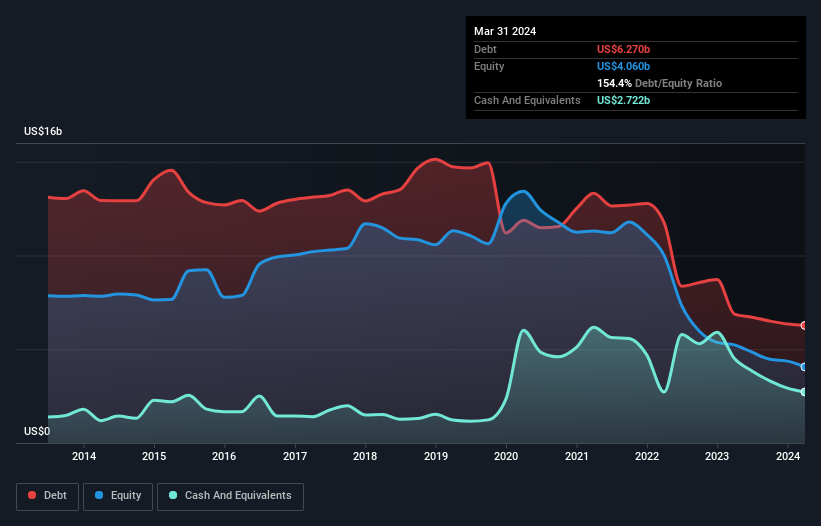- United States
- /
- Hospitality
- /
- NYSE:MGM
Does MGM Resorts International (NYSE:MGM) Have A Healthy Balance Sheet?

The external fund manager backed by Berkshire Hathaway's Charlie Munger, Li Lu, makes no bones about it when he says 'The biggest investment risk is not the volatility of prices, but whether you will suffer a permanent loss of capital.' It's only natural to consider a company's balance sheet when you examine how risky it is, since debt is often involved when a business collapses. As with many other companies MGM Resorts International (NYSE:MGM) makes use of debt. But the real question is whether this debt is making the company risky.
When Is Debt A Problem?
Debt and other liabilities become risky for a business when it cannot easily fulfill those obligations, either with free cash flow or by raising capital at an attractive price. Part and parcel of capitalism is the process of 'creative destruction' where failed businesses are mercilessly liquidated by their bankers. While that is not too common, we often do see indebted companies permanently diluting shareholders because lenders force them to raise capital at a distressed price. By replacing dilution, though, debt can be an extremely good tool for businesses that need capital to invest in growth at high rates of return. The first thing to do when considering how much debt a business uses is to look at its cash and debt together.
View our latest analysis for MGM Resorts International
What Is MGM Resorts International's Net Debt?
As you can see below, MGM Resorts International had US$6.27b of debt at March 2024, down from US$6.88b a year prior. However, it also had US$2.72b in cash, and so its net debt is US$3.55b.

How Healthy Is MGM Resorts International's Balance Sheet?
According to the last reported balance sheet, MGM Resorts International had liabilities of US$3.03b due within 12 months, and liabilities of US$35.0b due beyond 12 months. Offsetting these obligations, it had cash of US$2.72b as well as receivables valued at US$1.02b due within 12 months. So it has liabilities totalling US$34.3b more than its cash and near-term receivables, combined.
This deficit casts a shadow over the US$13.0b company, like a colossus towering over mere mortals. So we'd watch its balance sheet closely, without a doubt. At the end of the day, MGM Resorts International would probably need a major re-capitalization if its creditors were to demand repayment.
We use two main ratios to inform us about debt levels relative to earnings. The first is net debt divided by earnings before interest, tax, depreciation, and amortization (EBITDA), while the second is how many times its earnings before interest and tax (EBIT) covers its interest expense (or its interest cover, for short). This way, we consider both the absolute quantum of the debt, as well as the interest rates paid on it.
While MGM Resorts International's low debt to EBITDA ratio of 1.4 suggests only modest use of debt, the fact that EBIT only covered the interest expense by 6.1 times last year does give us pause. But the interest payments are certainly sufficient to have us thinking about how affordable its debt is. It was also good to see that despite losing money on the EBIT line last year, MGM Resorts International turned things around in the last 12 months, delivering and EBIT of US$1.7b. When analysing debt levels, the balance sheet is the obvious place to start. But ultimately the future profitability of the business will decide if MGM Resorts International can strengthen its balance sheet over time. So if you're focused on the future you can check out this free report showing analyst profit forecasts.
But our final consideration is also important, because a company cannot pay debt with paper profits; it needs cold hard cash. So it's worth checking how much of the earnings before interest and tax (EBIT) is backed by free cash flow. During the last year, MGM Resorts International generated free cash flow amounting to a very robust 94% of its EBIT, more than we'd expect. That puts it in a very strong position to pay down debt.
Our View
Neither MGM Resorts International's ability to handle its total liabilities nor its EBIT growth rate gave us confidence in its ability to take on more debt. But the good news is it seems to be able to convert EBIT to free cash flow with ease. When we consider all the factors discussed, it seems to us that MGM Resorts International is taking some risks with its use of debt. So while that leverage does boost returns on equity, we wouldn't really want to see it increase from here. There's no doubt that we learn most about debt from the balance sheet. However, not all investment risk resides within the balance sheet - far from it. For example, we've discovered 3 warning signs for MGM Resorts International that you should be aware of before investing here.
Of course, if you're the type of investor who prefers buying stocks without the burden of debt, then don't hesitate to discover our exclusive list of net cash growth stocks, today.
New: Manage All Your Stock Portfolios in One Place
We've created the ultimate portfolio companion for stock investors, and it's free.
• Connect an unlimited number of Portfolios and see your total in one currency
• Be alerted to new Warning Signs or Risks via email or mobile
• Track the Fair Value of your stocks
Have feedback on this article? Concerned about the content? Get in touch with us directly. Alternatively, email editorial-team (at) simplywallst.com.
This article by Simply Wall St is general in nature. We provide commentary based on historical data and analyst forecasts only using an unbiased methodology and our articles are not intended to be financial advice. It does not constitute a recommendation to buy or sell any stock, and does not take account of your objectives, or your financial situation. We aim to bring you long-term focused analysis driven by fundamental data. Note that our analysis may not factor in the latest price-sensitive company announcements or qualitative material. Simply Wall St has no position in any stocks mentioned.
About NYSE:MGM
MGM Resorts International
Through its subsidiaries, owns and operates casino, hotel, and entertainment resorts in the United States and internationally.
Very undervalued with mediocre balance sheet.
Similar Companies
Market Insights
Community Narratives




